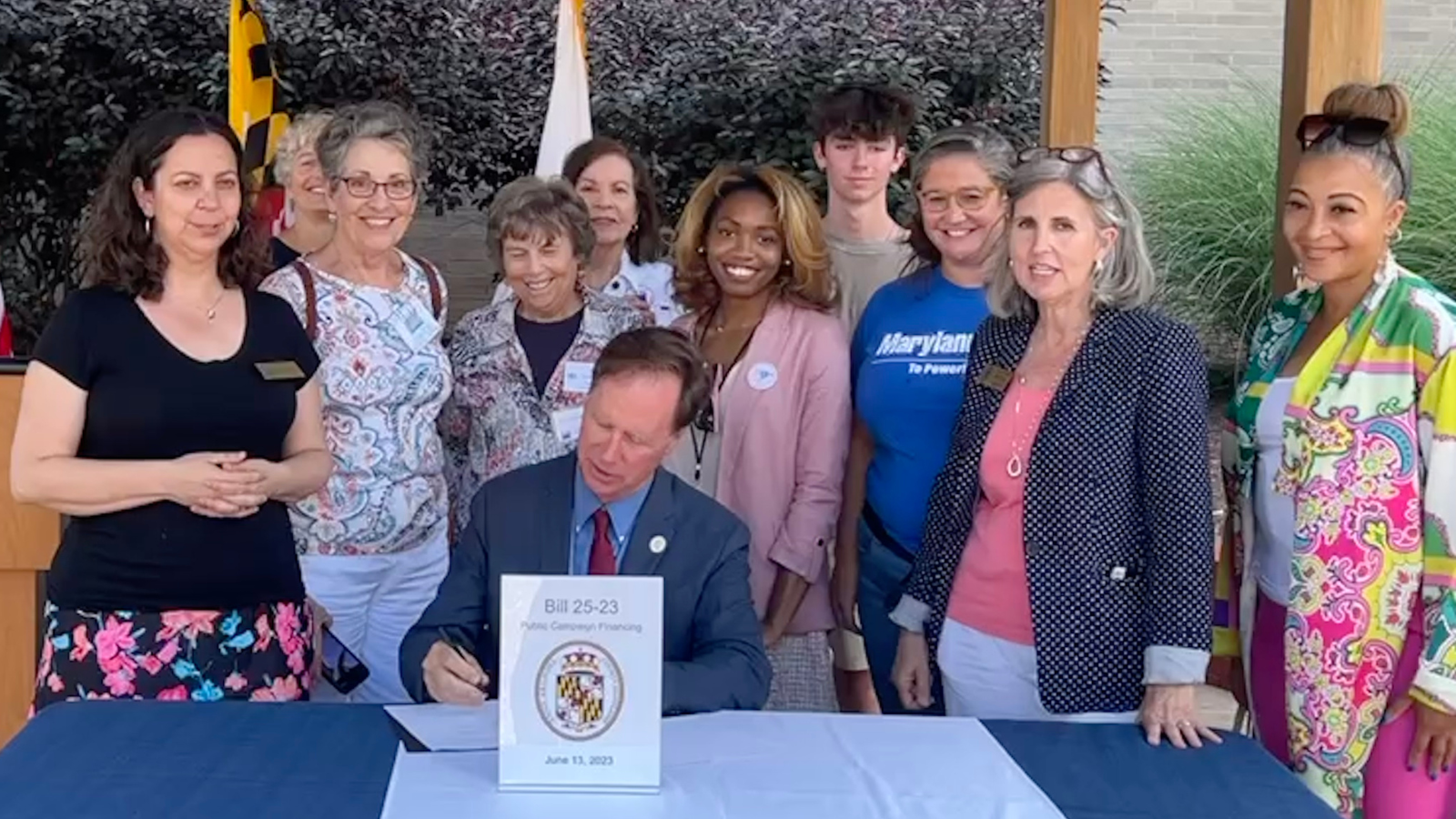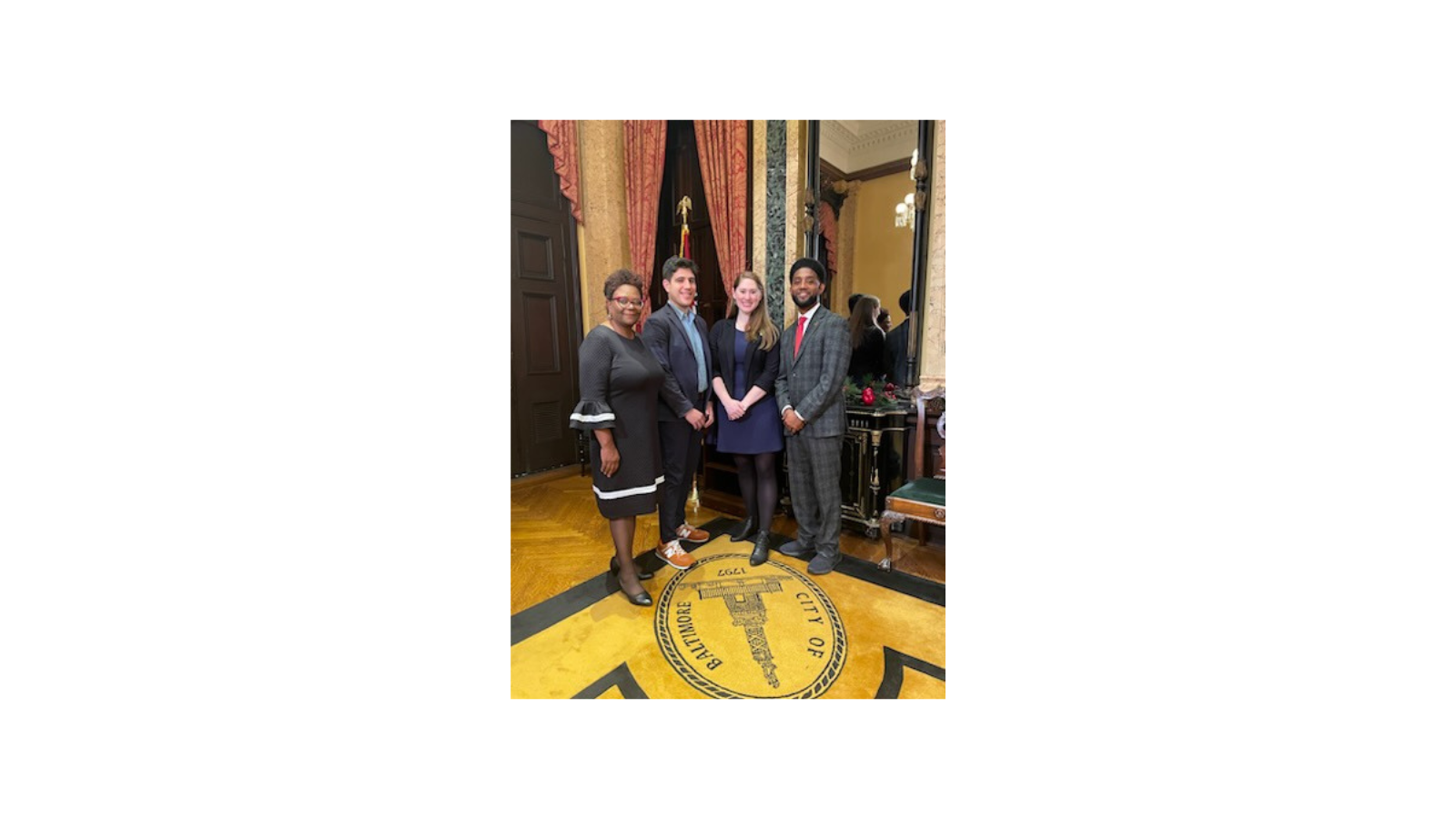Four Fabulous Wins for Democracy during the 2021 Maryland General Assembly
American democracy has faced immense challenges in the last year, and it is clear that our voting system and campaign finance laws need reform. But while an important federal election reform bill called the “For The People Act” has stalled in the U.S. Senate, a handful of states, notably Maryland, are pushing forward with building a better democracy.

American democracy has faced immense challenges in the last year, and it is clear that our voting system and campaign finance laws need reform. But while an important federal election reform bill called the “For The People Act” has stalled in the U.S. Senate, a handful of states, notably Maryland, are pushing forward with building a better democracy.
The Maryland General Assembly wrapped up its 2021 session on April 12th. This blog will highlight four fabulous policy areas where Maryland has continued to improve on its track record on democracy. Many of these reforms now sit on Gov. Hogan’s desk awaiting a veto-decision.
Win #1: Vote By Mail Enhancements
Because of the COVID-19 pandemic, many voters voted by mail for the first time in 2020, and around half of all voters sent in their ballots by mail in Maryland. As a result, we anticipate an increase in voting by mail in 2022 and beyond. Maryland legislators passed two major improvements to the vote-by-mail system:
-
Voters can now choose to join a permanent mail-in voting list and receive a ballot in the mail for every upcoming election. This means that elderly people, people with disabilities, and people who know they’ll vote by mail don’t have to fill out the same form for every election. Five states and Washington D.C. already have a permanent mail-in voting list, and several states have this list available for senior citizens and/or citizens with disabilites. The new process increases efficiency, reduces paperwork, and enables voters to choose how they want to cast their vote.
-
The State Legislature also took action to make ballot drop boxes a permanent fixture in Maryland elections. Ballot drop boxes are safe and secure ways for voters to return their mail-in ballots. They’re also popular – over one million Maryland voters used dropboxes in the 2020 primary elections. Drop boxes allow voters who are concerned about postmarking their ballot by the deadline to submit their ballots safely. Voters who received their mail-in ballot late, fear their ballot will be tampered with, or don’t trust the postal system can use drop boxes to vote confidently. Drop boxes also save local governments significant amounts of money because return postage is not required.
Governor Hogan let the legislation that creates a permanent mail-in voting list and makes ballot dropboxes permanent pass into law without his signature. These policies were championed by Sen. Kramer and Del. Wilkins.
Unfortunately, the General Assembly did not establish a process for ballot curing or improved ballot tracking, both of which were included in the Mail-In Voting Enhancement Act.
A ballot curing process would allow voters who forgot to sign their mail-in ballots to fix, or “cure,” their ballot by signing it at their local Board of Elections office. In Maryland, 4,772 mail-in ballots were rejected because they did not include a signature. Nobody should lose their voice in our democracy because they forgot to sign a piece of paper.
Additionally, up-to-date ballot tracking information helps reassure voters nervously waiting for their ballot and increases confidence in the electoral process. The state currently allows Marylanders to track the status of their ballot on the State Board of Elections website, but the website can take up to 2 weeks to update.
Win #2 – Increasing Early Voting Opportunities
Early voting centers play a crucial role in our elections, with nearly 1 million Marylanders voting in person at an early voting site in the 2020 general election. There have often been long lines at early voting sites because there are far fewer early voting sites than Election Day precinct sites.
The Maryland General Assembly passed two important bills to improve early voting:
-
Legislation sponsored by Del. Luedtke increased the number of early voting sites required in every county in Maryland. It also required the Board of Elections to take into account accessibility of these centers to historically disenfranchised communities, accessibility via public transportation, and equitable distribution of early voting centers throughout a county. For many Marylanders, early voting centers provide necessary flexibility for those who have work or other obligations on Election Day, and research shows that additional early voting sites lead to increased turnout. Gov. Hogan let this legislation pass into law without his signature.
-
In addition, legislation sponsored by Del. Washington and Sen. Washington extended the operating hours of early voting centers. Early voting centers have traditionally been open from 10 AM to 8 PM. Now, they will be open from 7 AM to 8 PM, the same hours as on Election Day. This will ensure that people with obligations such as work or childcare during the evenings have time to vote in the morning. This bill currently sits on Gov. Hogan’s desk.
Win #3 – Voter Empowerment Act
The Student and Military Voter Empowerment Act, sponsored by Del. Luedtke and Sen. Elfreth, aims to increase voter participation for student and military voters. Both students and military members participate in elections at rates lower than the general population, and the full participation of these groups is essential to create a representative, vibrant democracy. Our testimony in support of this bill has additional information.
This legislation passed with strong bipartisan support and is also currently on Gov. Hogan’s desk. Dozens of student leaders throughout Maryland sent a letter to Gov. Hogan calling on him to sign this bill into law.
Win #4 – Get Big Money Out of Politics
The Maryland Fair Elections Act, sponsored by Sen. Pinsky and Del. Feldmark, updates and funds the public campaign financing program for the gubernatorial race. The revised program allows participating candidates to only accept donations under $250 and only from individuals. In exchange, the small donations candidates do receive will be matched by a public fund. As a result, gubernatorial candidates can spend time speaking with their constituents instead of chasing big checks from wealthy donors, PACs and corporations. For more information, check out our press release on this legislation passing the General Assembly. This bill passed both chambers with overwhelming bipartisan support, and is now on Gov. Hogan’s desk awaiting his signature.
Lessons Learned
The Maryland General Assembly has done impressive work this year to ensure that Marylanders are able to participate in voting and to reduce the influence of big money in our elections. Other states should take note, and make sure they are supporting a democracy where everyone participates and everyone’s voice is heard. Here are some tips from Maryland:
- Focus on concrete change. To protect our democracy, we need to make progress now, one step at a time. Our focus is on making a difference in public policy and in our lives. Sometimes that means big change, like overhauling our campaign finance system. Sometimes that means extending voting options by a few hours a day.
- Figure out what works. State and municipalities truly are the laboratories for democracy. Communities across the country have tested a variety of methods for elections’ administration, and with innovation and research we can work together to enact the best public policy. Maryland PIRG has a 45-plus year track record of figuring out solutions that will work and advocating for them until we get results.
- Find common ground. Even in this deeply divided moment, democracy is a core tenant of America. On many of these policies, we’ve been able to find common ground and work with members of both parties to build a stronger democracy because ultimately, we’re all better off with a democracy where everyone has a voice and everyone is represented.
For More Information:
The Baltimore Sun – “Unlike many other states, Maryland’s legislature is moving to make it easier to vote early or by mail”
WYPR 88.1 – “Lawmakers Want To Simplify Voting For Students, Military”
The Baltimore Sun Editorial Board – “Fix Maryland’s failing system for public financing of gubinetorial campaigns”
Maryland Matters – “As Other States Move to Restrict Voting, the Maryland General Assembly Passed Bills to Expand Access”
Topics
Authors
Rishi Shah
Find Out More

Small donor public financing victory in Anne Arundel County

Anne Arundel County Considers Small Donor Public Financing

Mayor Scott swears in Fair Election Fund Commissioners

